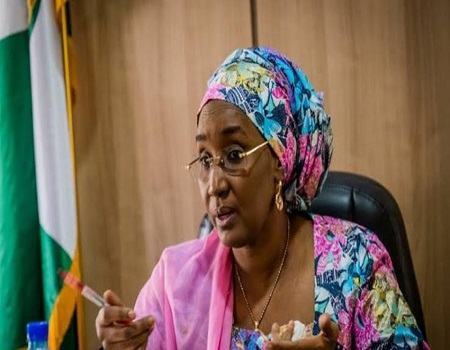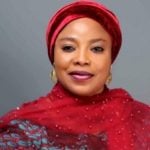Federal Government on Tuesday launched the National Policy on Internally Displaced Persons (IDP) as part of ongoing efforts toward ensuring effective coordination of the administration’s strategic response to the humanitarian challenges in the country.
The Minister of Humanitarian Affairs, Disaster Management and Social Development, Sadiya Umar Farouq unveiled the policy document along with the maiden edition of the Humanitarian Open House with the theme; ‘Coordinating for Durable Humanitarian Solutions; the Journey so far,’ a strategic communications initiative of the Ministry.
In the bid to ensure effective implementation of the policy, the Minister inaugurated the National Coordination Technical Working Group.
According to her, the Federal National Policy on IDP was approved by the Federal Executive Council (FEC) in September 2021.
“The process of developing and adoption of the policy commenced in 2001, and within this period, the initial draft of the policy has been reviewed severally to reflect new realities and emerging trends in the humanitarian space in Nigeria.
“This policy aims to provide a framework for national responsibility towards prevention and protection of citizens and, in some cases, non-citizens, from incidences of arbitrary and other forms of internal displacement, meet their assistance and protection needs during displacement, and ensure their rehabilitation, return, reintegration and relocation after displacement. The policy spells out principles guiding humanitarian assistance and implementation of durable solutions in situations of internal displacement in Nigeria and has adopted the human rights-based approach and its principles.
“It integrated the provisions of existing international conventions, treaties and protocols on internal displacement, guided by the dictates of international humanitarian and human rights laws. This policy, therefore, draws extensively on the guidance of international and national frameworks on the prevention of internal displacement, as well as those on protection and assistance of internally displaced persons. The Kampala Convention, the UN Guiding Principles on internal displacement, and the Sphere Minimum Standards for Humanitarian Assistance have significantly defined the direction of this policy.
“This policy envisions an equitable and stable Nigerian society that is proactive and responsive to situations that could lead to internal displacement, where the right to life of dignity is guaranteed for all internally displaced persons, and where adequate measures and durable solutions exist to prevent and mitigate the impact of internal displacement on vulnerable populations.”
While expressing satisfaction over the successes recorded through the implementation of the National Social Investment Programme (NSIP), Farouq argued that NSIP remains the biggest social protection and poverty eradication programme ever put in place by any government in Nigeria and one of the biggest in Africa.
IN CASE YOU MISSED THESE FROM NIGERIAN TRIBUNE
- ‘Officials initially offered to help but when the number of able-bodied citizens at the centre increased, they left us unattended to’
- Why Ogun Tops List Of ‘Yahoo Boys’ In Nigeria ― Governor Abiodun
- Police, Amotekun after criminals on Lagos-Ibadan expressway
- Suspected cannibal pays N500,000 for boy’s human organs, says ‘that’s my favourite meal, especially the throat’
- Court awards Nnamdi Kanu N1 billion over invasion of his home by military, asks FG to apologise
“It was established by President Buhari in 2016 to address immediate and long-term socio-economic imbalances and inequalities, alleviate poverty, and stimulate accelerated economic growth. The NSIP has four main clusters namely: N-Power; National Home-Grown School Feeding Programme (NHGSFP); Conditional Cash Transfer (CCT); and the Government Enterprise and Empowerment Programme (GEEP).
“Each of the programmes has been carefully designed to address specific socio-economic challenges and protect Nigerians from poverty, economic shocks and social vulnerabilities by increasing the income and livelihood of the poor and vulnerable households, reducing youth unemployment, increasing access to education and health services, eradicating malnutrition in school-age children and improving enrollment of school-age children, and providing affordable credit for Micro, Small and Medium Enterprises (MSMEs).
“In addition to these suites of programmes, the Federal Government, in partnership with the World Bank, established the National Social Safety Nets Programmes (NASSP), which created for the first time the National Social Register (NSR) of the poor and vulnerable households and individuals nationwide.”
Under the N-Power, the Ministry successfully exited the 500,000 Batch A and B N-Power beneficiaries in 2020 and received about 6.4 million applications for Batch C. From Batches A & B, a total of 109,823 beneficiaries have gone on to set up businesses in their communities, underlining and highlighting the impact and importance of the N-Power Programme.
According to her, the Government Enterprise and Empowerment Programme (GEEP) launched by Federal Government was aimed at addressing the challenges of credit and financial inclusion for the over 37 million Nigerians at the base of the economic pyramid, who are involved in active commercial activity, but have never had the opportunity to access loans.
Under the arrangement, GEEP has so far provided incremental loans of between N10,000 and N300,000 to about 2.3 million beneficiary traders, artisans, enterprising youths, agricultural workers and other micro-service providers under its flagship programs TraderMoni, MarketMoni and FarmerMoni.
“TraderMoni caters to poor and vulnerable enterprising youths, while MarketMoni caters to poor and vulnerable enterprising women and both components disburse N50,000 per beneficiary. Poor and rural farmers are captured under FarmerMoni, and the loan amount is N300,000. GEEP is also increasing financial inclusion by on-boarding beneficiaries into the formal financial system of banking.
“Registration of interested persons has been completed nationwide and digitization of the data collected is ongoing. We shall commence the disbursement of the GEEP 2.0 loans to successful beneficiaries shortly.
“The compelling need to keep stakeholders and partners, including the media, fully abreast with the Ministry’s programmes and activities is imperative to allow for accurate, consistent and sustained information dissemination of the mandate, vision, policy direction, activities, interventions and their huge impact on the lives and livelihood all Nigerians and others,” the Minister stressed.






